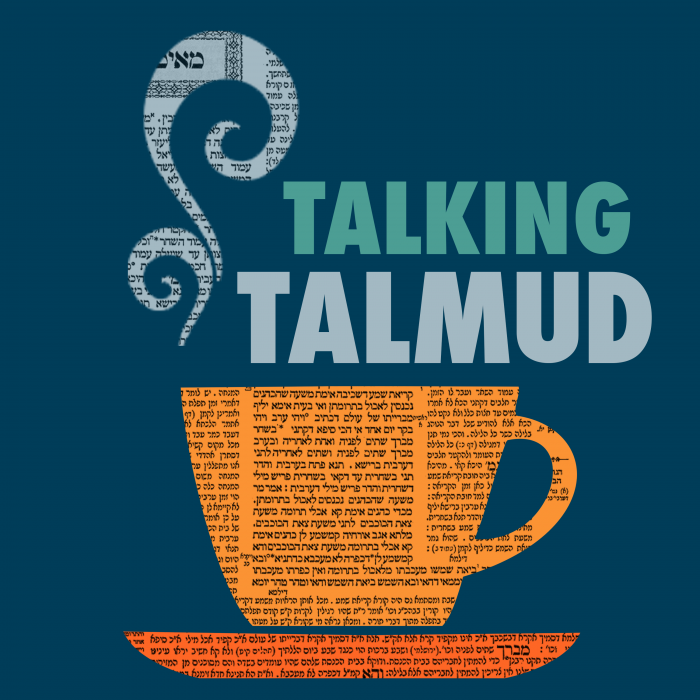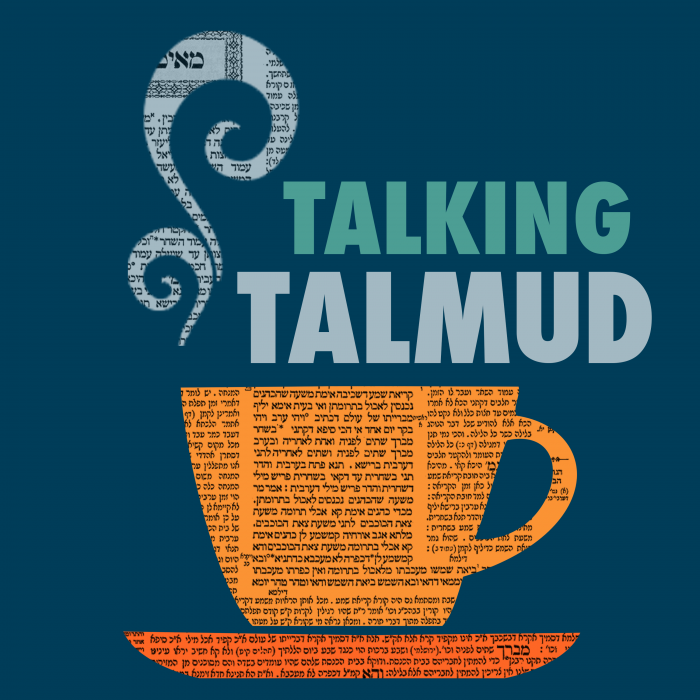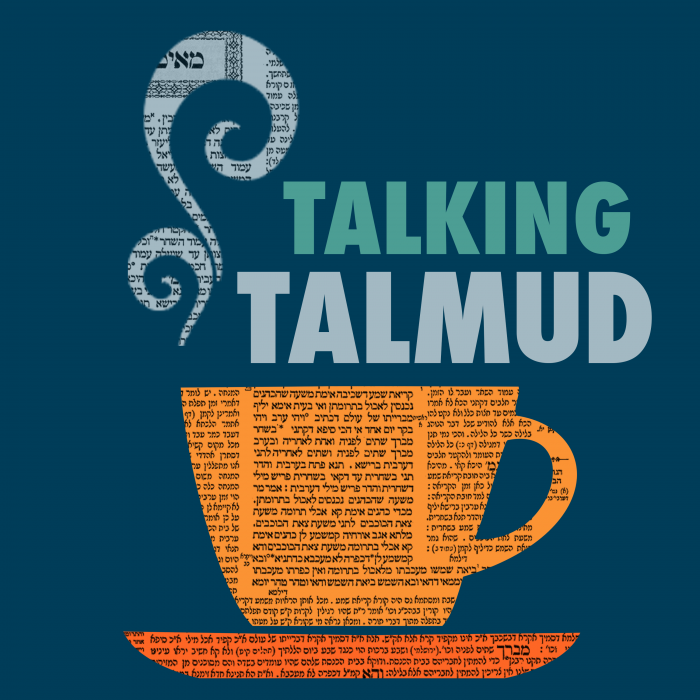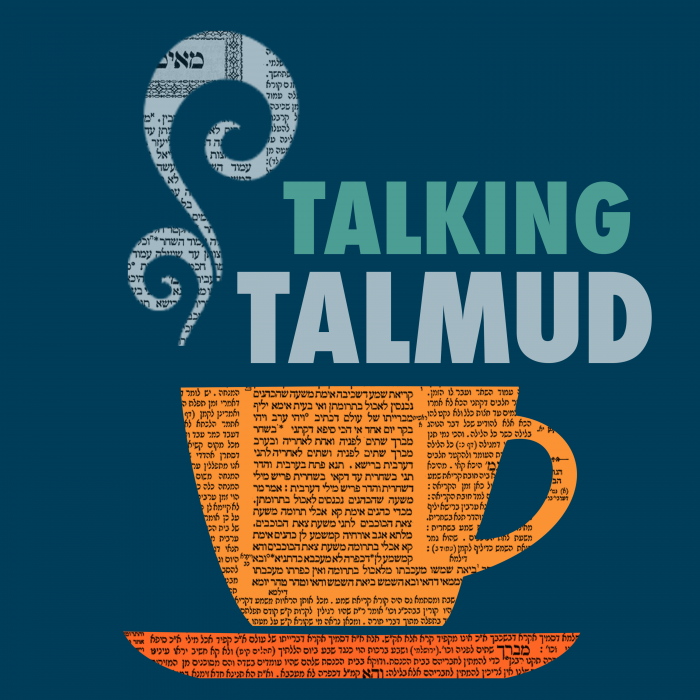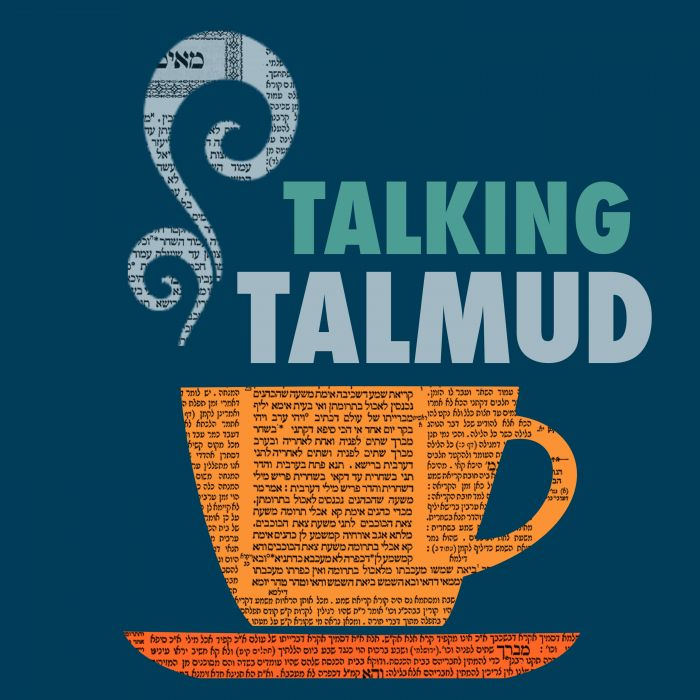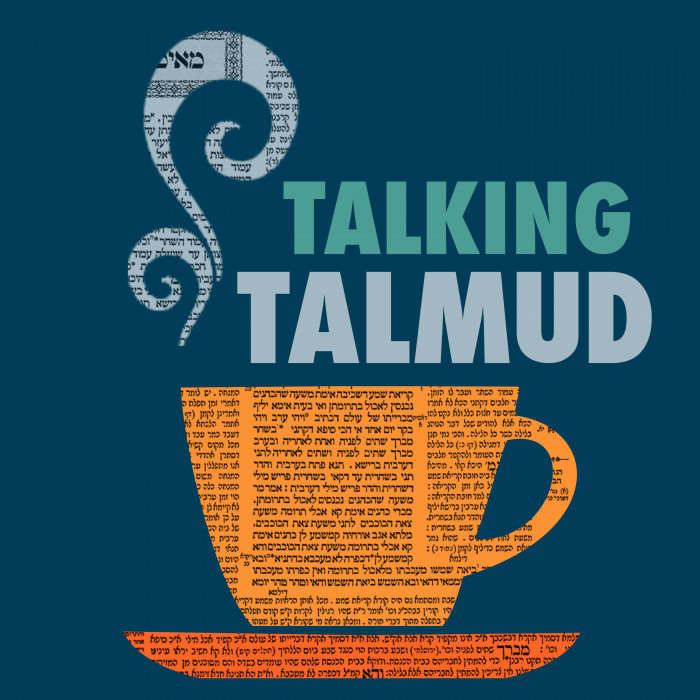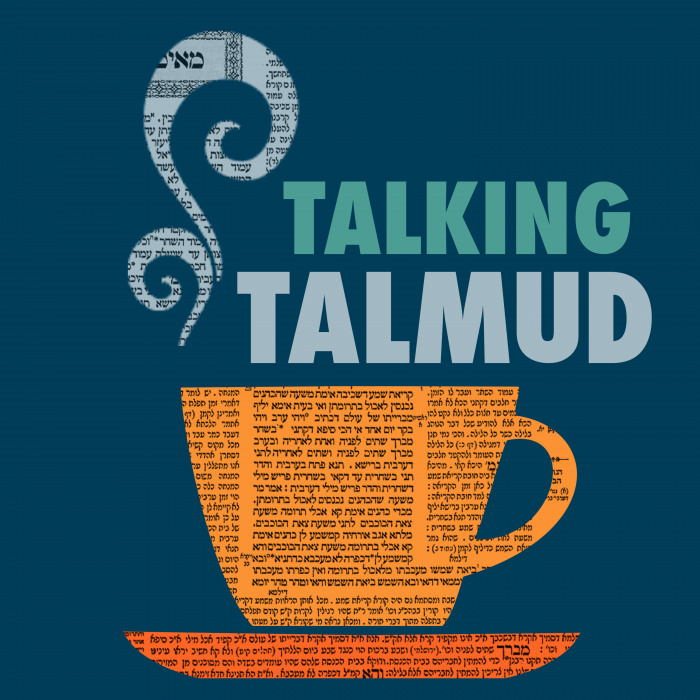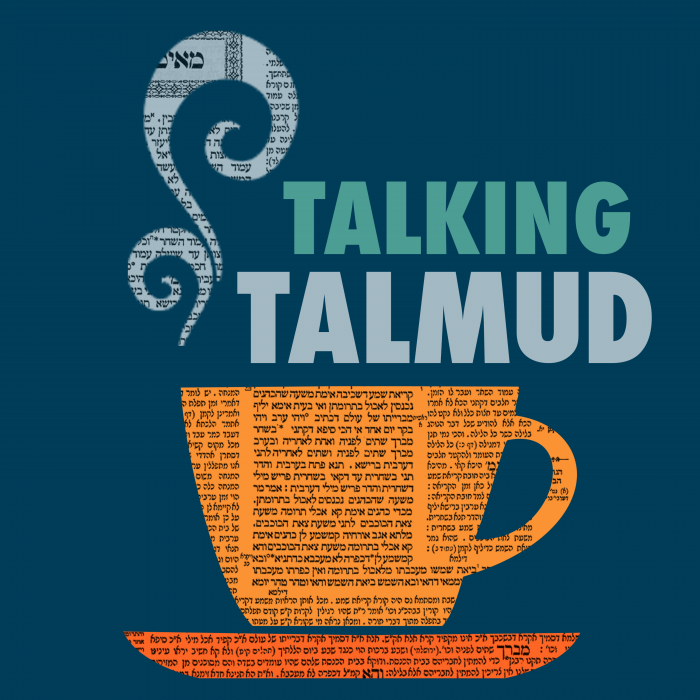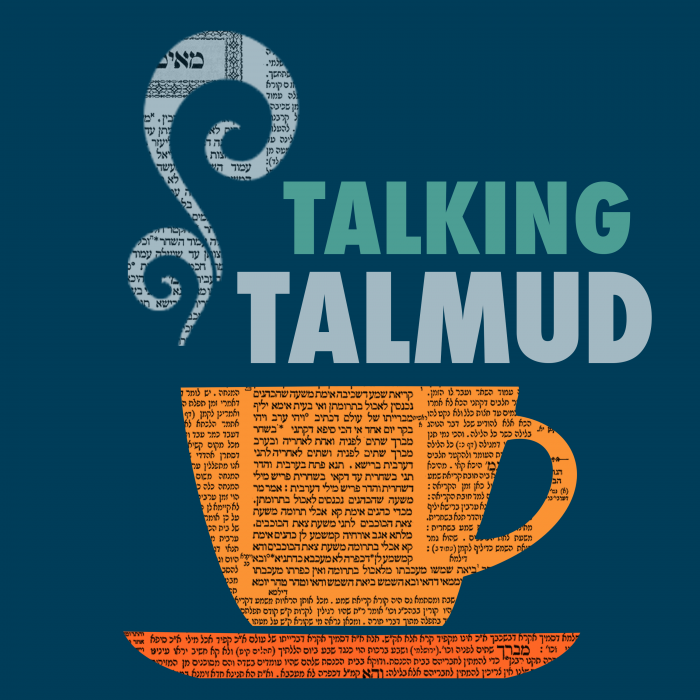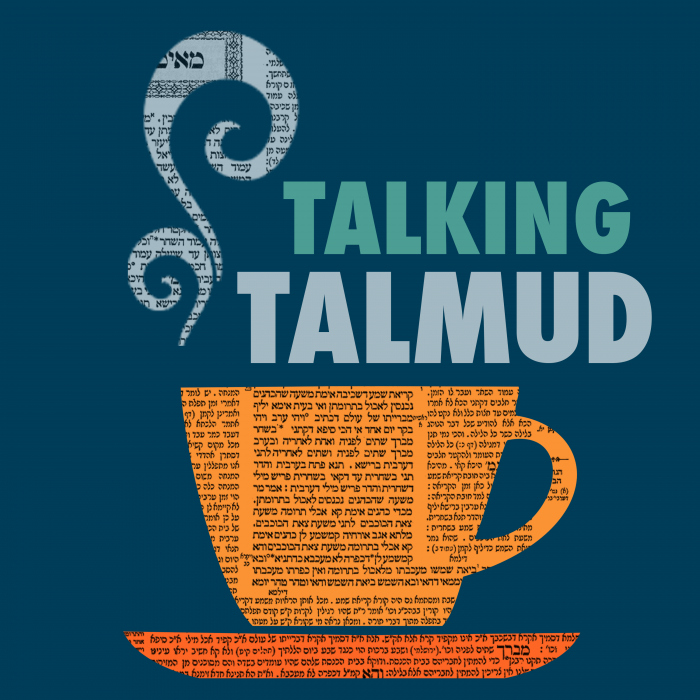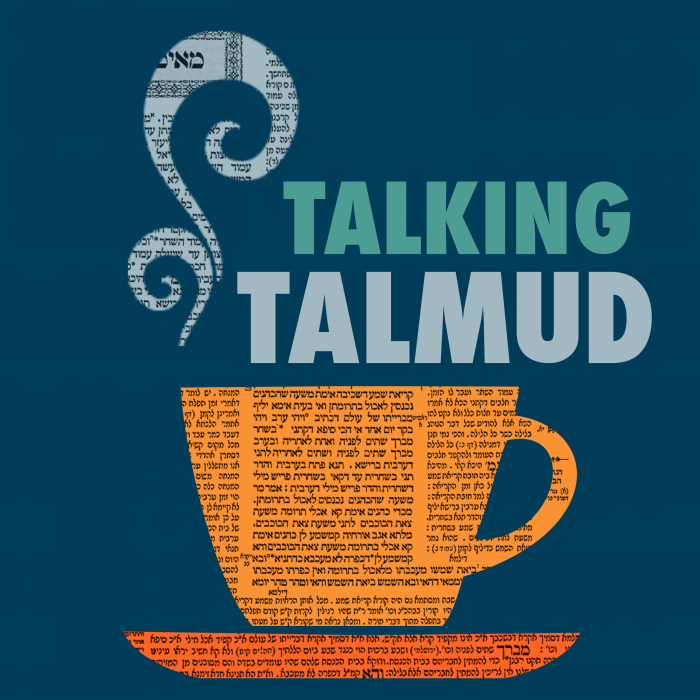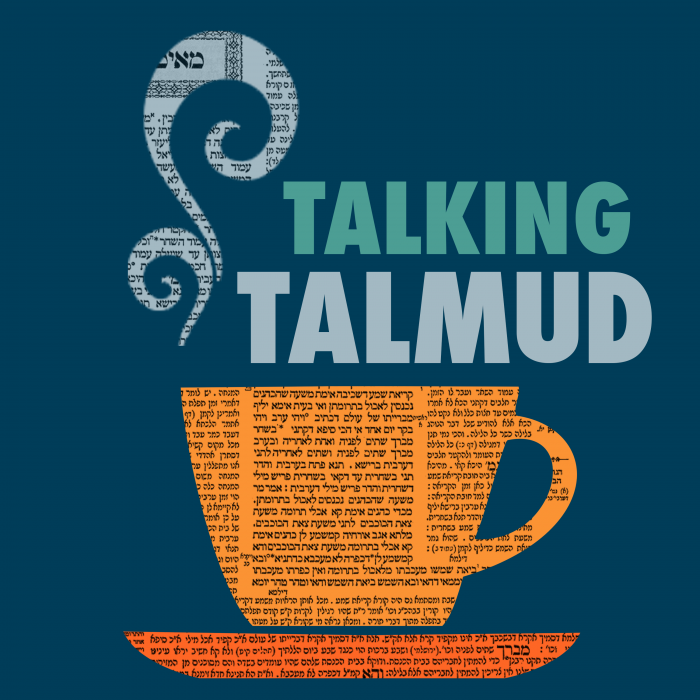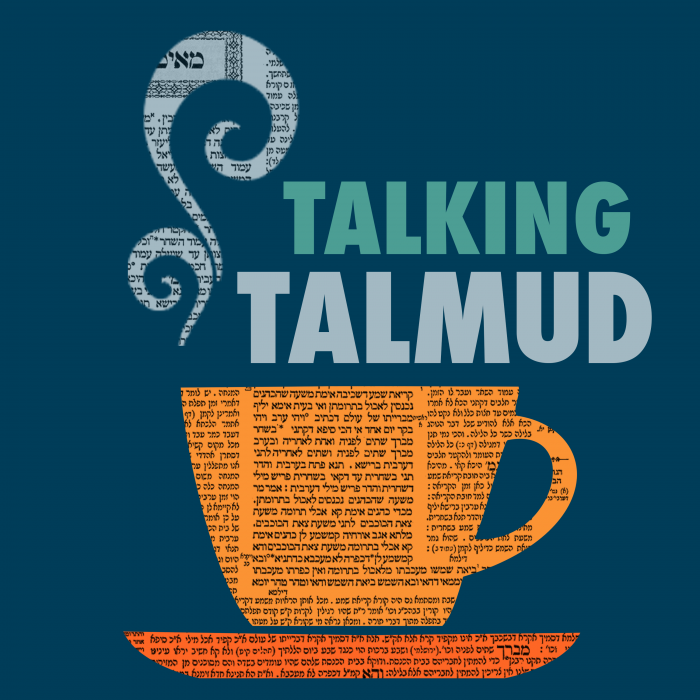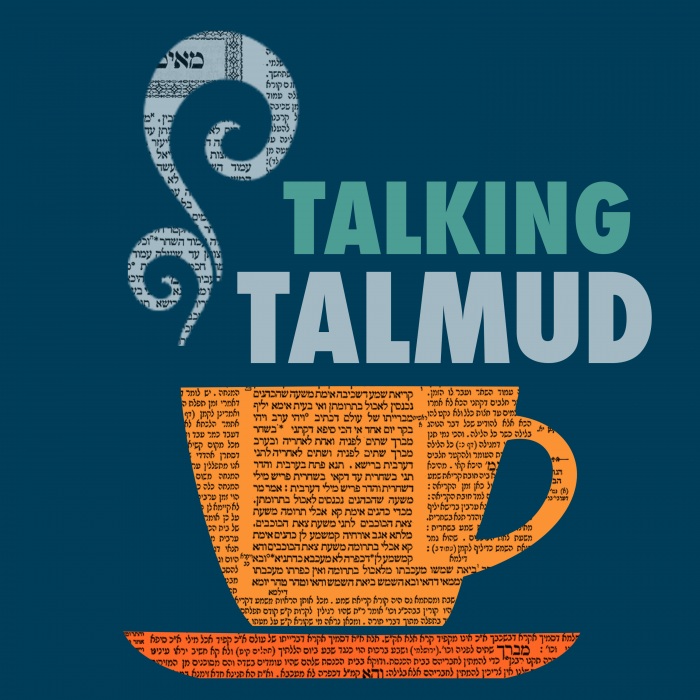Can you sleep with tefillin under your pillow? Can a man do that if he is in bed with his wife? If two people are sleeping naked in a bed, can they each turn the other way and say shema? Is there a difference if it is one’s wife or someone else? What if it is one’s young children? A hairsbreadth of a woman in a place that is usually covered is considered nakedness – to what is this referring and in what situation? What else is considered nakedness? Is it problematic of one yawns, sneezes or spits during prayer? There are contradictory sources regarding this – how are they resolved? Can one recite shema in a dirty place where there is feces or urine?
This week’s learning is sponsored by Nira Feldman in loving memory of her mother, Faye Darack Z’L 3rd yahrzeit. “She was a dedicated Hadran learner and continues to inspire us with her curiosity and love of learning each day. We miss her deeply.”
Want to dedicate learning? Get started here:


Today’s daily daf tools:
This week’s learning is sponsored by Nira Feldman in loving memory of her mother, Faye Darack Z’L 3rd yahrzeit. “She was a dedicated Hadran learner and continues to inspire us with her curiosity and love of learning each day. We miss her deeply.”
Today’s daily daf tools:
Delve Deeper
Broaden your understanding of the topics on this daf with classes and podcasts from top women Talmud scholars.
New to Talmud?
Check out our resources designed to help you navigate a page of Talmud – and study at the pace, level and style that fits you.
The Hadran Women’s Tapestry
Meet the diverse women learning Gemara at Hadran and hear their stories.
Berakhot 24
כֹּל לְנַטּוֹרִינְהוּ טְפֵי עֲדִיף. וְהֵיכָא מַנַּח לְהוּ? אָמַר רַבִּי יִרְמְיָה: בֵּין כַּר לְכֶסֶת, שֶׁלֹּא כְּנֶגֶד רֹאשׁוֹ.
Because whatever offers more protection is preferable even at the cost of deprecation. And where under his head does he place them? Rabbi Yirmeya said: He places them between the pillow and the mattress, not directly aligned with his head but rather a bit to the side.
וְהָא תָּנֵי רַבִּי חִיָּיא: מַנִּיחָן בְּכוֹבַע, תַּחַת מְרַאֲשׁוֹתָיו! דְּמַפֵּיק לֵיהּ לְמוּרְשָׁא דְכוֹבַע לְבַר.
The Gemara asks: Didn’t Rabbi Ḥiyya teach a baraita that in that case he places them in a pouch used for phylacteries, directly under his head? The Gemara replies: He does so in a manner that the bulge in the pouch, where the phylacteries are, protrudes out and is not beneath his head.
בַּר קַפָּרָא צָיַיר לְהוּ בְּכִילְּתָא, וּמַפִּיק לְמוּרְשְׁהוֹן לְבַר. רַב שִׁישָׁא בְּרֵיהּ דְּרַב אִידֵּי מַנַּח לְהוּ אַשַּׁרְשִׁיפָא, וּפָרֵיס סוּדָרָא עִילָּוַיְיהוּ.
On this note, the Gemara relates that Bar Kappara would tie them in his bed curtain and project their bulge outward. Rav Sheisha, son of Rav Idi, would place them on a bench and spread a cloth over them.
אָמַר רַב הַמְנוּנָא בְּרֵיהּ דְּרַב יוֹסֵף: זִימְנָא חֲדָא הֲוָה קָאֵימְנָא קַמֵּיהּ דְּרָבָא, וַאֲמַר לִי: זִיל אַיְיתִי לִי תְּפִילִּין. וְאַשְׁכַּחְתִּינְהוּ בֵּין כַּר לְכֶסֶת, שֶׁלֹּא כְּנֶגֶד רֹאשׁוֹ. וַהֲוָה יָדַעְנָא דְּיוֹם טְבִילָה הֲוָה, וּלְאַגְמוֹרַן הֲלָכָה לְמַעֲשֶׂה הוּא דַּעֲבַד.
Rav Hamnuna, son of Rav Yosef, said: I was once standing before Rava and he told me: Go and bring me my phylacteries. And I found them in his bed, between the mattress and the pillow, not aligned with his head. And I knew that it was the day of his wife’s immersion in the ritual bath for purification from the ritual impurity of a menstruating woman, and he certainly engaged in marital relations in order to fulfill the mitzva, and he did so, he sent me to bring him his phylacteries, to teach us the practical halakha in that case.
בְּעָא מִינֵּיהּ רַב יוֹסֵף בְּרֵיהּ דְּרַב נְחוּנְיָא מֵרַב יְהוּדָה: שְׁנַיִם שֶׁיְּשֵׁנִים בְּמִטָּה אַחַת, מַהוּ שֶׁזֶּה יַחֲזִיר פָּנָיו וְיִקְרָא קְרִיאַת שְׁמַע, וְזֶה יַחֲזִיר פָּנָיו וְיִקְרָא קְרִיאַת שְׁמַע? אֲמַר לֵיהּ: הָכִי אָמַר שְׁמוּאֵל: וַאֲפִילּוּ אִשְׁתּוֹ עִמּוֹ.
Rav Yosef, son of Rav Neḥunya, who raised a dilemma above, raised a dilemma before Rav Yehuda: Two individuals sleeping in a single bed, given that it was standard practice to sleep without clothing, what is the halakha; is it permissible for this one to turn his head aside and recite Shema and for that one turns his head and recites Shema; or is it prohibited because they are unclothed and are considered unfit to recite Shema even though they are covered with a blanket? He said to him: Shmuel said as follows: This is permitted even if his wife is in bed with him.
מַתְקִיף לַהּ רַב יוֹסֵף: אִשְׁתּוֹ וְלָא מִיבַּעְיָא אַחֵר?! אַדְּרַבָּה, אִשְׁתּוֹ כְּגוּפוֹ, אַחֵר לָאו כְּגוּפוֹ.
Rav Yosef strongly objects to this response: You say that he is permitted to recite Shema in bed with his wife, and needless to say he is permitted to do so when in bed with another. On the contrary, since his wife is like his own flesh, and he will not have lustful thoughts of her, it is permitted; another is not like his own flesh and it is prohibited.
מֵיתִיבִי: שְׁנַיִם שֶׁיְּשֵׁנִים בְּמִטָּה אַחַת — זֶה מַחֲזִיר פָּנָיו וְקוֹרֵא, וְזֶה מַחֲזִיר פָּנָיו וְקוֹרֵא. וְתַנְיָא אַחֲרִיתִי: הַיָּשֵׁן בַּמִּטָּה, וּבָנָיו וּבְנֵי בֵיתוֹ בְּצִדּוֹ, הֲרֵי זֶה לֹא יִקְרָא קְרִיאַת שְׁמַע, אֶלָּא אִם כֵּן הָיְתָה טַלִּית מַפְסֶקֶת בֵּינֵיהֶן. וְאִם הָיוּ בָּנָיו וּבְנֵי בֵיתוֹ קְטַנִּים — מוּתָּר.
The Gemara raises an objection to this from the resolution of an apparent contradiction between two baraitot. It was taught in one baraita: Two unclothed individuals who are sleeping in a single bed, this one turns his head aside and recites Shema and that one turns his head aside and recites Shema. And it was taught in another baraita: One who is sleeping in bed and his unclothed children and members of his household are beside him, may not recite Shema unless a garment separates between them. If his children and the members of his household were minors, it is permitted to recite Shema even without a garment separating between them.
בִּשְׁלָמָא לְרַב יוֹסֵף לָא קַשְׁיָא, הָא אִשְׁתּוֹ, וְהָא בְּאַחֵר. אֶלָּא לִשְׁמוּאֵל קַשְׁיָא?
Granted, according to Rav Yosef, the apparent contradiction between the two baraitot is not difficult, as this baraita is referring to a case where his wife is in the bed with him, while this other baraita is referring to a case where another person is in bed with him and there is concern lest he will have lustful thoughts. However, according to Shmuel, who permits one to recite Shema regardless of who is in bed with him, it is indeed difficult. How would he interpret the baraita that prohibits?
אָמַר לְךָ שְׁמוּאֵל: לְרַב יוֹסֵף מִי נִיחָא? וְהָתַנְיָא הָיָה יָשֵׁן בַּמִּטָּה, וּבָנָיו וּבְנֵי בֵיתוֹ בַּמִּטָּה — לֹא יִקְרָא קְרִיאַת שְׁמַע אֶלָּא אִם כֵּן הָיְתָה טַלִּיתוֹ מַפְסֶקֶת בֵּינֵיהֶן. אֶלָּא מַאי אִית לָךְ לְמֵימַר — אִשְׁתּוֹ לְרַב יוֹסֵף תַּנָּאֵי הִיא, לְדִידִי נָמֵי תַּנָּאֵי הִיא.
The Gemara replies: Shmuel could have said to you: And according to Rav Yosef’s opinion, does it work out well? Wasn’t it taught in that same baraita that one who is sleeping in bed and his children and members of his household are beside him, may not recite Shema unless a garment separates between them? Doesn’t Rav Yosef hold that his wife is like his own flesh and no separation is necessary? Rather, what have you to say in response? Rav Yosef holds that there is a tannaitic dispute in the case of one’s wife; I, too, hold that it is a tannaitic dispute, and I accept the ruling of one of the baraitot.
אָמַר מָר: זֶה מַחֲזִיר פָּנָיו וְקוֹרֵא קְרִיאַת שְׁמַע. וְהָא אִיכָּא עֲגָבוֹת! מְסַיַּיע לֵיהּ לְרַב הוּנָא, דְּאָמַר רַב הוּנָא: עֲגָבוֹת אֵין בָּהֶם מִשּׁוּם עֶרְוָה. לֵימָא מְסַיַּיע לֵיהּ לְרַב הוּנָא: הָאִשָּׁה יוֹשֶׁבֶת, וְקוֹצָה לָהּ חַלָּתָהּ עֲרוּמָּה, מִפְּנֵי שֶׁיְּכוֹלָה לְכַסּוֹת פָּנֶיהָ בְּקַרְקַע, אֲבָל לֹא הָאִישׁ.
The Gemara reverts to clarify something mentioned above. The Master said in a baraita: This one turns his head aside and recites Shema. The Gemara notes a difficulty: Aren’t there bare buttocks? This supports the opinion of Rav Huna, as Rav Huna said: Buttocks do not constitute nakedness. Let us say that the following mishna supports Rav Huna’s opinion: A woman sits and separates her ḥalla naked, despite the fact that she must recite a blessing over the separation of the ḥalla, because she can cover her face, a euphemism for her genitals, in the ground, but a male, whose genitals are not covered when he sits, may not do so. The mishna teaches that exposed buttocks do not constitute nakedness.
תַּרְגְּמַהּ רַב נַחְמָן בַּר יִצְחָק: כְּגוֹן שֶׁהָיוּ פָּנֶיהָ טוּחוֹת בַּקַּרְקַע.
Rav Naḥman bar Yitzḥak interpreted the mishna as referring to a case where her face, genitals, was completely covered in the ground such that her posterior was covered by the ground. Therefore, proof for Rav Huna’s opinion cannot be brought from this mishna.
אָמַר מָר: אִם הָיוּ בָּנָיו וּבְנֵי בֵּיתוֹ קְטַנִּים, מוּתָּר: וְעַד כַּמָּה? אָמַר רַב חִסְדָּא: תִּינוֹקֶת בַּת שָׁלֹשׁ שָׁנִים וְיוֹם אֶחָד, וְתִינוֹק בֶּן תֵּשַׁע שָׁנִים וְיוֹם אֶחָד. אִיכָּא דְאָמְרִי: תִּינוֹקֶת בַּת אַחַת עֶשְׂרֵה שָׁנָה וְיוֹם אֶחָד, וְתִינוֹק בֶּן שְׁתֵּים עֶשְׂרֵה שָׁנָה וְיוֹם אֶחָד. אִידֵּי וְאִידֵּי עַד כְּדַי ״שָׁדַיִם נָכֹנוּ וּשְׂעָרֵךְ צִמֵּחַ״.
The Master said in a baraita: If his children and the members of his household were minors, even though they are unclothed, it is permitted to recite Shema even without a garment separating between them. The Gemara asks: Until what age is one still considered a minor? Rav Ḥisda said: A girl until she is three years and one day old, and a boy until he is nine years and one day old, for these are the ages from which a sexual act in which they participate is considered a sexual act. Some say: A girl eleven years and one day old and a boy of twelve years and one day old, as that is the age at which they are considered adults in this regard. This age is only approximate, as the age of majority for both this, the boy, and that, the girl, is at the onset of puberty in accordance with the verse: “Your breasts were formed and your hair was grown” (Ezekiel 16:7).
אֲמַר לֵיהּ רַב כָּהֲנָא לְרַב אָשֵׁי: הָתָם אָמַר רָבָא: אַף עַל גַּב דִּתְיוּבְתָּא דִּשְׁמוּאֵל, הִלְכְתָא כְּווֹתֵיהּ דִּשְׁמוּאֵל. הָכָא מַאי? אֲמַר לֵיהּ: אַטּוּ כּוּלְּהוּ בַּחֲדָא מְחִתָא מְחִתִינְהוּ? אֶלָּא הֵיכָא דְּאִיתְּמַר — אִיתְּמַר, וְהֵיכָא דְּלָא אִיתְּמַר — לָא אִיתְּמַר.
Rav Kahana said to Rav Ashi: There, with regard to the law of phylacteries, Rava said: Despite a conclusive refutation of the opinion of Shmuel, the halakha is in accordance with the opinion of Shmuel. Here, what is the ruling? He said to him: Were all of them woven in the same act of weaving? Are there no distinctions between different cases? Rather, where it is stated, it is stated, and where it is not stated, it is not stated, and there is no comparison.
אֲמַר לֵיהּ רַב מָרִי לְרַב פָּפָּא: שֵׂעָר יוֹצֵא בְּבִגְדוֹ מַהוּ? קְרָא עֲלֵיהּ: שֵׂעָר, שֵׂעָר.
Rav Mari said to Rav Pappa: Does it constitute nakedness if one’s pubic hair protruded from his garment? Rav Pappa said about him: A hair, a hair. You are splitting hairs and being pedantic over trivialities.
אָמַר ר׳ יִצְחָק: טֶפַח בָּאִשָּׁה עֶרְוָה. לְמַאי? אִילֵּימָא לְאִסְתַּכּוֹלֵי בַּהּ, וְהָא אָמַר רַב שֵׁשֶׁת: לָמָּה מָנָה הַכָּתוּב תַּכְשִׁיטִין שֶׁבַּחוּץ עִם תַּכְשִׁיטִין שֶׁבִּפְנִים — לוֹמַר לָךְ כׇּל הַמִּסְתַּכֵּל בְּאֶצְבַּע קְטַנָּה שֶׁל אִשָּׁה, כְּאִילּוּ מִסְתַּכֵּל בִּמְקוֹם הַתּוֹרֶף.
Rabbi Yitzḥak stated: An exposed handbreadth in a woman constitutes nakedness. The Gemara asks: Regarding which halakha was this said? If you say that it comes to prohibit looking at an exposed handbreadth in her, didn’t Rav Sheshet say: Why did the verse enumerate “anklets and bracelets, rings, earrings and girdles” (Numbers 31:50), jewelry that is worn externally, over her clothing, e.g., bracelets, together with jewelry worn internally, beneath her clothing, near her nakedness, e.g., girdles? This was to tell you: Anyone who gazes upon a woman’s little finger is considered as if he gazed upon her naked genitals, for if his intentions are impure, it makes no difference where he looks or how much is exposed; even less than a handbreadth.
אֶלָּא בְּאִשְׁתּוֹ וְלִקְרִיאַת שְׁמַע.
Rather, it is referring even to his wife, with regard to the recitation of Shema. One may not recite Shema before an exposed handbreadth of his wife.
אָמַר רַב חִסְדָּא: שׁוֹק בָּאִשָּׁה עֶרְוָה, שֶׁנֶּאֱמַר: ״גַּלִּי שׁוֹק עִבְרִי נְהָרוֹת״, וּכְתִיב: ״תִּגָּל עֶרְוָתֵךְ וְגַם תֵּרָאֶה חֶרְפָּתֵךְ״. אָמַר שְׁמוּאֵל: קוֹל בָּאִשָּׁה — עֶרְוָה, שֶׁנֶּאֱמַר: ״כִּי קוֹלֵךְ עָרֵב וּמַרְאֵךְ נָאוֶה״. אָמַר רַב שֵׁשֶׁת: שֵׂעָר בָּאִשָּׁה עֶרְוָה, שֶׁנֶּאֱמַר: ״שַׂעֲרֵךְ כְּעֵדֶר הָעִזִּים״.
Along these lines, Rav Ḥisda said: Even a woman’s exposed leg is considered nakedness, as it is stated: “Uncover the leg and pass through the rivers” (Isaiah 47:2), and it is written in the following verse: “Your nakedness shall be revealed and your shame shall be seen” (Isaiah 47:3). Shmuel further stated: A woman’s singing voice is considered nakedness, which he derives from the praise accorded a woman’s voice, as it is stated: “Sweet is your voice and your countenance is alluring” (Song of Songs 2:14). Similarly, Rav Sheshet stated: Even a woman’s hair is considered nakedness, for it too is praised, as it is written: “Your hair is like a flock of goats, trailing down from Mount Gilead” (Song of Songs 4:1).
אָמַר רַבִּי חֲנִינָא: אֲנִי רָאִיתִי אֶת רַבִּי שֶׁתָּלָה תְּפִילָּיו. מֵיתִיבִי: הַתּוֹלֶה תְּפִילָּיו יִתָּלוּ לוֹ חַיָּיו!
The Gemara resumes its discussion of phylacteries. Rabbi Ḥanina said: I saw Rabbi Yehuda HaNasi hang his phylacteries. The Gemara raises an objection: It was taught in a baraita that one who hangs his phylacteries will have his life hang in the balance.
דּוֹרְשֵׁי חֲמוּרוֹת אָמְרוּ: ״וְהָיוּ חַיֶּיךָ תְּלֻאִים לְךָ מִנֶּגֶד״, זֶה הַתּוֹלֶה תְּפִילָּיו.
Moreover, the Symbolic Interpreters of the Torah said that the verse: “And your life shall hang in doubt before you [minneged]” (Deuteronomy 28:66), that is the punishment of one who hangs his phylacteries.
לָא קַשְׁיָא הָא בִּרְצוּעָה. הָא בִּקְצִיצָה.
The Gemara replies: This apparent contradiction is not difficult, as this baraita, which condemns one who hangs his phylacteries, refers to one who hangs them by the strap, allowing the leather boxes into which the parchment is placed to dangle in a deprecating way, which is certainly prohibited. That baraita, which relates that Rabbi Yehuda HaNasi would hang his phylacteries and that it is clearly permitted, refers to when one hangs them from the box with the straps dangling.
וְאִיבָּעֵית אֵימָא: לָא שְׁנָא רְצוּעָה וְלָא שְׁנָא קְצִיצָה — אָסוּר. וְכִי תְּלָה רַבִּי — בְּכִיסְתָּא תְּלָה.
And if you wish, say another explanation instead: There is no difference whether he hangs the phylacteries from the strap and there is no difference whether he hangs the phylacteries from the box; both are prohibited. And when Rabbi Yehuda HaNasi hung his phylacteries, he hung them in their pouch.
אִי הָכִי מַאי לְמֵימְרָא? מַהוּ דְתֵימָא תִּיבְעֵי הַנָּחָה כְּסֵפֶר תּוֹרָה — קָא מַשְׁמַע לַן.
The Gemara asks: If so, what is the purpose to relate that incident? The Gemara replies: Lest you say that phylacteries would require placement atop a surface, as is the custom with a Torah scroll. Therefore, it teaches us that this is unnecessary.
וְאָמַר רַבִּי חֲנִינָא: אֲנִי רָאִיתִי אֶת רַבִּי שֶׁגִּיהֵק וּפִיהֵק וְנִתְעַטֵּשׁ וְרָק
Since Rabbi Ḥanina related a story involving Rabbi Yehuda HaNasi, the Gemara cites another such story. Rabbi Ḥanina said: I saw Rabbi Yehuda HaNasi, while he was praying, belch, yawn, sneeze, spit,
וּמְמַשְׁמֵשׁ בְּבִגְדוֹ, אֲבָל לֹא הָיָה מִתְעַטֵּף. וּכְשֶׁהוּא מְפַהֵק הָיָה מַנִּיחַ יָדוֹ עַל סַנְטֵרוֹ.
and if he was stung by a louse, he may feel for it and remove it with his garment, but he would not wrap himself in his prayer shawl if it fell during prayer. And when he would yawn he would place his hand on his chin so that his open mouth would not be visible.
מֵיתִיבִי: הַמַּשְׁמִיעַ קוֹלוֹ בִּתְפִלָּתוֹ — הֲרֵי זֶה מִקְּטַנֵּי אֲמָנָה. הַמַּגְבִּיהַּ קוֹלוֹ בִּתְפִלָּתוֹ הֲרֵי זֶה מִנְּבִיאֵי הַשֶּׁקֶר.
The Gemara raises an objection based on a baraita: One who sounds his voice during his Amida prayer is among those of little faith, as he seems to believe that the Lord cannot hear his prayer when it is uttered silently. One who raises his voice during prayer is considered to be among the false prophets, as they too were wont to cry out and shout to their gods.
מְגַהֵק וּמְפַהֵק — הֲרֵי זֶה מִגַּסֵּי הָרוּחַ. הַמִּתְעַטֵּשׁ בִּתְפִלָּתוֹ — סִימָן רַע לוֹ. וְיֵשׁ אוֹמְרִים: נִיכָּר שֶׁהוּא מְכוֹעָר. הָרָק בִּתְפִלָּתוֹ — כְּאִילּוּ רָק בִּפְנֵי הַמֶּלֶךְ.
Furthermore, one who belches and yawns while praying is surely among the uncouth. One who sneezes during his prayer, for him it is a bad omen. And some say: It is clear that he is repulsive. Also, one who spits during prayer, it is tantamount to spitting in the face of the king. In light of all this, how could Rabbi Yehuda HaNasi have done all that while praying?
בִּשְׁלָמָא מְגַהֵק וּמְפַהֵק לָא קַשְׁיָא: כָּאן לְאוֹנְסוֹ, כָּאן לִרְצוֹנוֹ. אֶלָּא מִתְעַטֵּשׁ אַמִּתְעַטֵּשׁ קַשְׁיָא!
The Gemara explains: Granted, with regard to one who belches and yawns, it is not difficult: Here, in the case where Rabbi Yehuda HaNasi did so, it was involuntary and therefore permissible; here, where it is considered uncouth, is in a case where it is deliberate. However, the contradiction between sneezing in the case where Rabbi Yehuda HaNasi did so and sneezing where it is considered a bad omen is difficult.
מִתְעַטֵּשׁ אַמִּתְעַטֵּשׁ נָמֵי לָא קַשְׁיָא, כָּאן מִלְּמַעְלָה, כָּאן מִלְּמַטָּה. דְּאָמַר רַב זֵירָא: הָא מִילְּתָא אִבַּלְעָא לִי בֵּי רַב הַמְנוּנָא וּתְקִילָא לִי כִּי כּוּלֵּי תַּלְמוּדַאי: הַמִּתְעַטֵּשׁ בִּתְפִלָּתוֹ סִימָן יָפֶה לוֹ, כְּשֵׁם שֶׁעוֹשִׂים לוֹ נַחַת רוּחַ מִלְּמַטָּה, כָּךְ עוֹשִׂים לוֹ נַחַת רוּחַ מִלְּמַעְלָה.
The Gemara responds: The contradiction between sneezing in one case and sneezing in the other case is also not difficult: Here, in the case of Rabbi Yehuda HaNasi, it is referring to sneezing from above, his nose; here, where it is a bad omen, is referring to sneezing from below, flatulence. As Rav Zeira said: In the school of Rav Hamnuna I absorbed this matter in passing, and it is equal in significance to all the rest of my learning: One who sneezes in the midst of prayer, it is a good omen for him. Just as the sneeze soothes his irritation, giving him pleasure below, it is a sign that they are similarly giving him pleasure above. Since Rav Zeira sneezed often, he was extremely pleased to hear this.
אֶלָּא רָק אַרָק קַשְׁיָא! רָק אַרָק נָמֵי לָא קַשְׁיָא, אֶפְשָׁר כִּדְרַב יְהוּדָה. דְּאָמַר רַב יְהוּדָה: הָיָה עוֹמֵד בִּתְפִילָּה וְנִזְדַּמֵּן לוֹ רוֹק — מַבְלִיעוֹ בְּטַלִּיתוֹ. וְאִם טַלִּית נָאֶה הוּא — מַבְלִיעוֹ בַּאֲפַרְקְסוּתוֹ. רָבִינָא הֲוָה קָאֵי אֲחוֹרֵי רַב אָשֵׁי, נִזְדַּמֵּן לוֹ רוֹק, פַּתְקֵיהּ לַאֲחוֹרֵיהּ. אֲמַר לֵיהּ: לָא סָבַר לַהּ מָר לְהָא דְּרַב יְהוּדָה מַבְלִיעוֹ בַּאֲפַרְקְסוּתוֹ? אֲמַר לֵיהּ: אֲנָא אֲנִינָא דַּעְתַּאי.
However, The contradiction between spitting in the case where Rabbi Yehuda HaNasi did so and spitting where it is deemed tantamount to spitting in the face of the king is difficult. The Gemara replies: The contradiction between spitting in one case and spitting in the other case is also not difficult, as it is possible to resolve it in accordance with the opinion of Rav Yehuda, as Rav Yehuda said: One who was standing in prayer, and saliva happened to accumulate in his mouth, he absorbs it in his garment. And if it was a fine garment and he does not want it to become sullied, he may cover it up in his head covering. That way, one is permitted to spit. The Gemara relates: Ravina was standing behind Rav Ashi during prayer when saliva happened to accumulate in his mouth, so he discharged it behind him. Rav Ashi said to him: And does the Master not hold in accordance with that statement of Rav Yehuda, who said that one absorbs it in his head covering? He said to him: I am delicate, and the mere knowledge that there is spittle in my head covering disturbs my prayer.
הַמַּשְׁמִיעַ קוֹלוֹ בִּתְפִלָּתוֹ הֲרֵי זֶה מִקְּטַנֵּי אֲמָנָה. אָמַר רַב הוּנָא: לֹא שָׁנוּ, אֶלָּא שֶׁיָּכוֹל לְכַוֵּון אֶת לִבּוֹ בְּלַחַשׁ, אֲבָל אֵין יָכוֹל לְכַוֵּון אֶת לִבּוֹ בְּלַחַשׁ — מוּתָּר. וְהָנֵי מִילֵּי, בְּיָחִיד, אֲבָל בְּצִיבּוּר — אָתֵי לְמִיטְרַד צִיבּוּרָא.
It was taught in a baraita: One who sounds his voice during his Amida prayer is among those of little faith. Rav Huna said: This was only taught in a case where one is able to focus his heart while praying silently, but if he is unable to focus his heart while praying silently, he is permitted to sound his voice. This applies only to one praying alone, but when he is praying in a congregation his voice will come to disturb the congregation and it is prohibited.
רַבִּי אַבָּא הֲוָה קָא מִשְׁתְּמִיט מִינֵּיהּ דְּרַב יְהוּדָה דַּהֲוָה קָא בָּעֵי לְמִיסַּק לְאַרְעָא דְיִשְׂרָאֵל, דְּאָמַר רַב יְהוּדָה: כׇּל הָעוֹלֶה מִבָּבֶל לְאֶרֶץ יִשְׂרָאֵל — עוֹבֵר בַּעֲשֵׂה, שֶׁנֶּאֱמַר: ״בָּבֶלָה יוּבָאוּ וְשָׁמָּה יִהְיוּ עַד יוֹם פׇּקְדִי אוֹתָם נְאֻם ה׳״. אָמַר: אֵיזִיל וְאֶשְׁמַע מִינֵּיהּ מִילְּתָא מִבֵּית וַועֲדָא, וַהֲדַר אֶפֹּיק.
The Gemara relates that Rabbi Abba was avoiding being seen by his teacher Rav Yehuda, as Rabbi Abba sought to ascend to Eretz Yisrael and his teacher disapproved, as Rav Yehuda said: Anyone who ascends from Babylonia to Eretz Yisrael transgresses a positive commandment, as it is stated: “They shall be taken to Babylonia and there they shall remain until the day that I recall them, said the Lord” (Jeremiah 27:22). Rabbi Abba did not want to discuss his desire to emigrate with Rav Yehuda. Nevertheless he said: I will go and hear something from him at the hall where the Sages assemble, without being seen, and afterwards I will leave Babylonia.
אֲזַל, אַשְׁכְּחֵיהּ לְתַנָּא דְּקָתָנֵי קַמֵּיהּ דְּרַב יְהוּדָה: הָיָה עוֹמֵד בִּתְפִלָּה וְנִתְעַטֵּשׁ — מַמְתִּין עַד שֶׁיִּכְלֶה הָרוּחַ וְחוֹזֵר וּמִתְפַּלֵּל. אִיכָּא דְאָמְרִי: הָיָה עוֹמֵד בִּתְפִלָּה וּבִיקֵּשׁ לְהִתְעַטֵּשׁ — מַרְחִיק לְאַחֲרָיו אַרְבַּע אַמּוֹת, וּמִתְעַטֵּשׁ, וּמַמְתִּין עַד שֶׁיִּכְלֶה הָרוּחַ, וְחוֹזֵר וּמִתְפַּלֵּל, וְאוֹמֵר: ״רִבּוֹנוֹ שֶׁל עוֹלָם, יְצַרְתָּנוּ נְקָבִים נְקָבִים חֲלוּלִים חֲלוּלִים, גָּלוּי וְיָדוּעַ לְפָנֶיךָ חֶרְפָּתֵנוּ וּכְלִימָּתֵנוּ בְּחַיֵּינוּ וּבְאַחֲרִיתֵנוּ רִמָּה וְתוֹלֵעָה״, וּמַתְחִיל מִמָּקוֹם שֶׁפָּסַק.
He went and found the tanna, who recites the tannaitic sources before the study hall, reciting the following baraita before Rav Yehuda: One who was standing in prayer and sneezed from below waits until the odor dissipates and resumes praying. Some say: One who was standing in prayer when he felt the need to sneeze from below, retreats four cubits, sneezes, waits until the odor dissipates and resumes praying. And before resuming his prayer, he says: Master of the universe, You have formed us with many orifices and cavities; our disgrace and shame in life are clear and evident before You, as is our destiny with maggots and worms, and so we should not be judged harshly. And he resumes his prayer from where he stopped.
אֲמַר לֵיהּ: אִילּוּ לֹא בָּאתִי אֶלָּא לִשְׁמוֹעַ דָּבָר זֶה — דַּיִּי.
Rabbi Abba said to him: Had I only come to the assembly of the Sages to hear this teaching, it would have been sufficient for me.
תָּנוּ רַבָּנַן: הָיָה יָשֵׁן בְּטַלִּיתוֹ, וְאֵינוֹ יָכוֹל לְהוֹצִיא אֶת רֹאשׁוֹ מִפְּנֵי הַצִּנָּה — חוֹצֵץ בְּטַלִּיתוֹ עַל צַוָּארוֹ, וְקוֹרֵא קְרִיאַת שְׁמַע. וְיֵשׁ אוֹמְרִים: עַל לִבּוֹ.
The Sages taught: One who was sleeping unclothed, but was covered with his garment, and he is unable to stick his head out from under the garment because of the cold, may form a barrier with his garment at his neck and recite Shema in bed. And some say: He must form a barrier with his garment at his heart.
וְתַנָּא קַמָּא הֲרֵי לִבּוֹ רוֹאֶה אֶת הָעֶרְוָה! קָסָבַר לִבּוֹ רוֹאֶה אֶת הָעֶרְוָה — מוּתָּר.
The Gemara asks: And according to the first tanna, shouldn’t he be prohibited from reciting Shema because his heart sees his nakedness, as there is no barrier between them? The Gemara responds: Indeed, the first tanna holds that when one’s heart sees his nakedness, it is permitted to recite Shema, and a barrier is only necessary to separate between his mouth and his nakedness.
אָמַר רַב הוּנָא אָמַר רַבִּי יוֹחָנָן: הָיָה מְהַלֵּךְ בִּמְבוֹאוֹת הַמְטוּנָּפוֹת — מַנִּיחַ יָדוֹ עַל פִּיו וְקוֹרֵא קְרִיאַת שְׁמַע. אֲמַר לֵיהּ רַב חִסְדָּא: הָאֱלֹהִים! אִם אַמְרָהּ לִי רַבִּי יוֹחָנָן בְּפוּמֵּיהּ — לָא צָיֵיתְנָא לֵיהּ.
Rav Huna said that Rabbi Yoḥanan said: One who was walking in alleyways filthy with human excrement and he must recite Shema, he places his hand over his mouth and recites Shema. Rav Ḥisda said to him: By God! Even if Rabbi Yoḥanan had said it to me directly, with his own mouth, I would not have obeyed him.
אִיכָּא דְאָמְרִי: אָמַר רַבָּה בַּר בַּר חָנָה אָמַר רַבִּי יְהוֹשֻׁעַ בֶּן לֵוִי: הָיָה מְהַלֵּךְ בִּמְבוֹאוֹת הַמְטוּנָּפוֹת — מַנִּיחַ יָדוֹ עַל פִּיו וְקוֹרֵא קְרִיאַת שְׁמַע. אֲמַר לֵיהּ רַב חִסְדָּא: הָאֱלֹהִים! אִם אַמְרָהּ לִי רַבִּי יְהוֹשֻׁעַ בֶּן לֵוִי בְּפוּמֵּיהּ — לָא צָיֵיתְנָא לֵיהּ.
Some say this halakha: Rabba bar bar Ḥana said that Rabbi Yehoshua ben Levi said: One who was walking in alleyways filthy with human excrement and he must recite Shema, he places his hand over his mouth and recites Shema. Rav Ḥisda said to him: By God! Even if Rabbi Yehoshua ben Levi had said it to me directly, with his own mouth, I would not have obeyed him.
וּמִי אָמַר רַב הוּנָא הָכִי? וְהָאָמַר רַב הוּנָא: תַּלְמִיד חָכָם אָסוּר לוֹ לַעֲמוֹד בִּמְקוֹם הַטִּנּוֹפֶת לְפִי שֶׁאִי אֶפְשָׁר לוֹ לַעֲמוֹד בְּלִי הִרְהוּר תּוֹרָה! לָא קַשְׁיָא, כָּאן — בְּעוֹמֵד, כָּאן — בִּמְהַלֵּךְ.
The Gemara challenges this: Did Rav Huna really say that? Didn’t Rav Huna say: A Torah scholar is prohibited from standing in a place of filth, as he is unable to stand without contemplating Torah, and uttering Shema orally is graver than mere contemplation. The Gemara responds: This is not difficult; here, Rav Huna prohibited contemplating Torah in a case where one is standing in a place of filth, while here he permitted to recite Shema in a case where one is walking through a place of filth.
וּמִי אָמַר רַבִּי יוֹחָנָן הָכִי? וְהָאָמַר רַבָּה בַּר בַּר חָנָה אָמַר רַבִּי יוֹחָנָן: בְּכָל מָקוֹם מוּתָּר לְהַרְהֵר בְּדִבְרֵי תוֹרָה, חוּץ מִבֵּית הַמֶּרְחָץ וּמִבֵּית הַכִּסֵּא. וְכִי תֵּימָא: הָכָא נָמֵי כָּאן בְּעוֹמֵד כָּאן בִּמְהַלֵּךְ — אִינִי, וְהָא רַבִּי אֲבָהוּ הֲוָה קָא אָזֵיל בָּתְרֵיהּ דְּרַבִּי יוֹחָנָן וַהֲוָה קָא קָרֵי קְרִיאַת שְׁמַע. כִּי מְטָא בִּמְבוֹאוֹת הַמְטוּנָּפוֹת אִשְׁתִּיק. אֲמַר לֵיהּ לְרַבִּי יוֹחָנָן: לְהֵיכָן אֶהְדַּר? אֲמַר לֵיהּ: אִם שָׁהִיתָ כְּדֵי לִגְמוֹר אֶת כּוּלָּהּ — חֲזוֹר לָרֹאשׁ!
The Gemara asks: Did Rabbi Yoḥanan really say that? Didn’t Rabba bar bar Ḥana say that Rabbi Yoḥanan said: One is permitted to contemplate matters of Torah everywhere, except the bathhouse and the bathroom? Consequently, it is prohibited to even contemplate Torah in a place of filth. And if you say: Here, too, there is a distinction between the two cases, here, Rabbi Yoḥanan prohibited contemplating Torah in a case where one is standing; here, Rabbi Yoḥanan permitted to recite Shema in a case where one is walking, is that so? Wasn’t Rabbi Abbahu walking after Rabbi Yoḥanan and reciting Shema, and when he reached a filthy alleyway he fell silent and stopped reciting Shema. When they emerged, Rabbi Abbahu said to Rabbi Yoḥanan: To where in Shema should I return and resume reciting it? Rabbi Yoḥanan said to him: If you delayed continuing Shema for an interval sufficient to complete the entire Shema, return to the beginning and recite it from there. From the fact that Rabbi Yoḥanan did not admonish him for interrupting his recitation, apparently he, too, prohibits reciting Shema while walking through a filthy alleyway.
הָכִי קָאָמַר לֵיהּ: לְדִידִי לָא סְבִירָא לִי, לְדִידָךְ דִּסְבִירָא לָךְ, אִם שָׁהִיתָ כְּדֵי לִגְמוֹר אֶת כּוּלָּהּ חֲזוֹר לָרֹאשׁ.
The Gemara responds: This is not a proof, as he says to him as follows: I do not hold that one must interrupt the recitation of Shema in this case, but for you, who holds that one must, if you delayed Shema for an interval sufficient to complete the entire Shema, return to the beginning and recite it from there.
תַּנְיָא כְּוָתֵיהּ דְּרַב הוּנָא, תַּנְיָא כְּוָתֵיהּ דְּרַב חִסְדָּא. תַּנְיָא כְּוָתֵיהּ דְּרַב הוּנָא: הַמְהַלֵּךְ בִּמְבוֹאוֹת הַמְטוּנָּפוֹת — מַנִּיחַ יָדוֹ עַל פִּיו וְיִקְרָא קְרִיאַת שְׁמַע. תַּנְיָא כְּוָתֵיהּ דְּרַב חִסְדָּא: הָיָה מְהַלֵּךְ בִּמְבוֹאוֹת הַמְטוּנָּפוֹת — לֹא יִקְרָא קְרִיאַת שְׁמַע, וְלֹא עוֹד אֶלָּא שֶׁאִם הָיָה קוֹרֵא וּבָא — פּוֹסֵק.
The Gemara cites tannaitic sources to corroborate both the lenient and the stringent opinions. It is taught in a baraita in accordance with the opinion of Rav Huna, and it is taught in a baraita in accordance with the opinion of Rav Ḥisda. It is taught in a baraita in accordance with the opinion of Rav Huna: One who was walking in filthy alleyways places his hand over his mouth and recites Shema. It is taught in a baraita in accordance with the opinion of Rav Ḥisda: One who was walking in filthy alleyways may not recite Shema. Furthermore, if he was in the course of reciting Shema when he reached a filthy alleyway, he stops his recitation at that point.
לֹא פָּסַק — מַאי? אָמַר רַבִּי מְיָאשָׁה בַּר בְּרֵיהּ דְּרַבִּי יְהוֹשֻׁעַ בֶּן לֵוִי: עָלָיו הַכָּתוּב אוֹמֵר: ״וְגַם אֲנִי נָתַתִּי לָהֶם חֻקִּים לֹא טוֹבִים וּמִשְׁפָּטִים לֹא יִחְיוּ בָּהֶם״.
The Gemara asks: If one did not stop, what is his status? Rabbi Meyasha, son of the son of Rabbi Yehoshua ben Levi, said: Of him the verse says: “Moreover, I gave them statutes that were not good and laws by which they could not live” (Ezekiel 20:25), as in this case following these statutes and laws led to sin, not to mitzva.
רַב אַסִּי אָמַר: ״הוֹי מוֹשְׁכֵי הֶעָוֹן בְּחַבְלֵי הַשָּׁוְא״. רַב אַדָּא בַּר אַהֲבָה אָמַר מֵהָכָא: ״כִּי דְבַר ה׳ בָּזָה״.
Rav Asi said that this is derived from the verse: “Woe to those who draw iniquity with cords of vanity” (Isaiah 5:18), meaning that this man brings sin upon himself for naught. Rav Adda bar Ahava said it is derived from here: “For he has shown contempt for the word of the Lord” (Numbers 15:31), meaning that uttering God’s word in a place of filth shows contempt for the Lord.
וְאִם פָּסַק מַה שְּׂכָרוֹ? אָמַר רַבִּי אֲבָהוּ: עָלָיו הַכָּתוּב אוֹמֵר: ״וּבַדָּבָר הַזֶּה תַּאֲרִיכוּ יָמִים״.
The Gemara asks: And if he stopped his recitation, what is his reward? Rabbi Abbahu said: Of him the verse says: “And it is through this matter that you will prolong your days” (Deuteronomy 32:47), meaning that by being careful with one’s speech one merits longevity.
אָמַר רַב הוּנָא: הָיְתָה טַלִּיתוֹ חֲגוּרָה לוֹ עַל מׇתְנָיו — מוּתָּר לִקְרוֹת קְרִיאַת שְׁמַע. תַּנְיָא נָמֵי הָכִי: הָיְתָה טַלִּיתוֹ שֶׁל בֶּגֶד וְשֶׁל עוֹר וְשֶׁל שַׂק חֲגוּרָה עַל מׇתְנָיו — מוּתָּר לִקְרוֹת קְרִיאַת שְׁמַע.
Rav Huna said: One whose garment was tied around his waist, even if he was bare above the waist, is permitted to recite Shema. Indeed, that opinion was also taught in a baraita: One whose garment made of cloth, of leather, of sack or of any other material was strapped around his waist, he is permitted to recite Shema.



